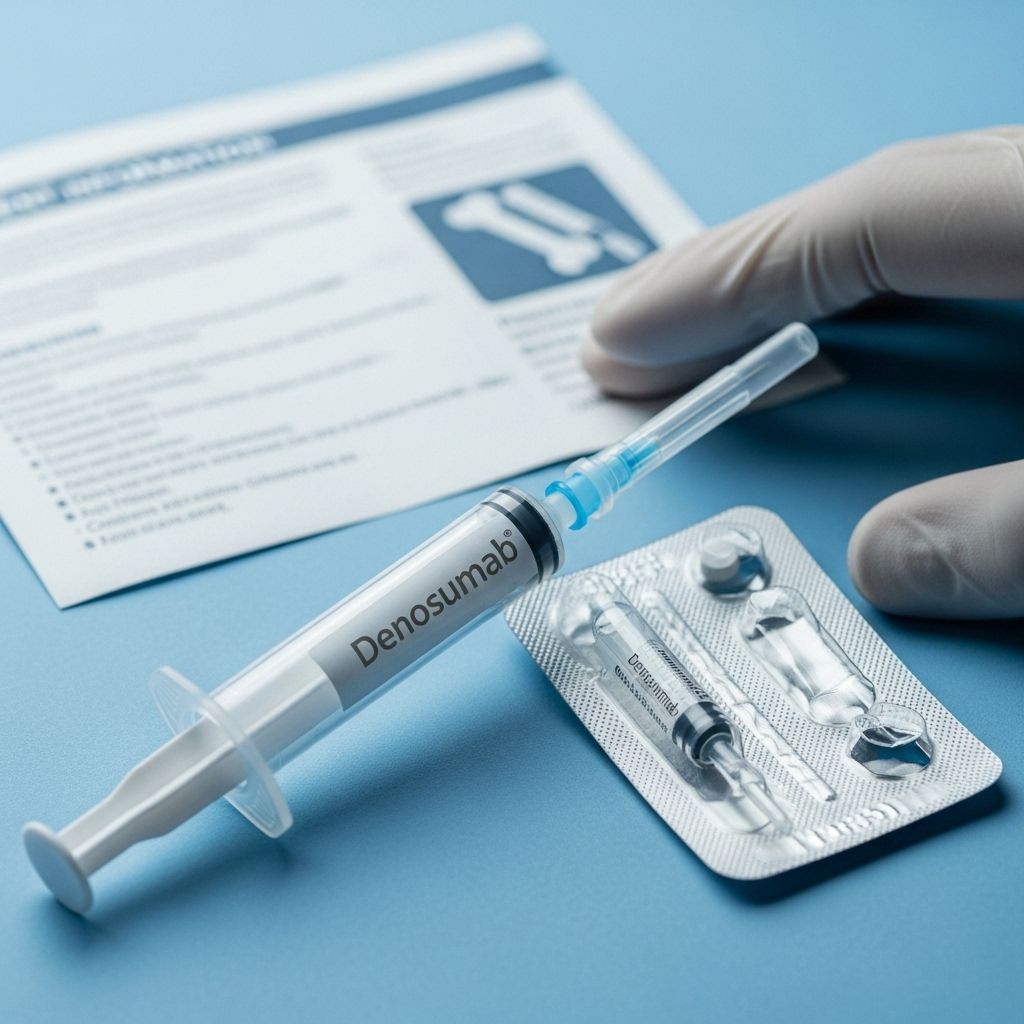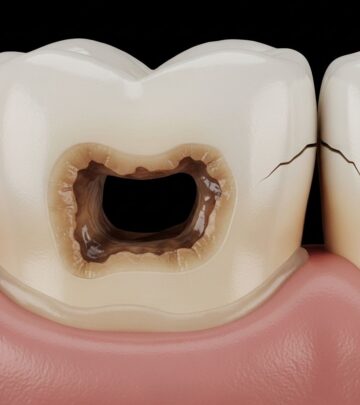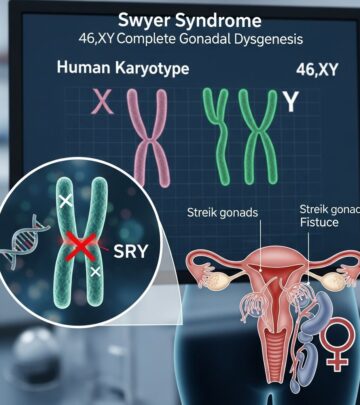Denosumab Injection: Uses, Precautions, Side Effects, and Patient Guidance
Learn all about Denosumab injection, its uses, important precautions, dosing, side effects, and answers to frequently asked questions for patients and caregivers.

Denosumab Injection: Comprehensive Patient Information
Denosumab injection is a medication prescribed to treat conditions where bone strength is compromised, such as osteoporosis in postmenopausal women, men at high risk of fractures, and individuals experiencing bone loss from specific treatments. This guide provides essential information about its uses, precautions, administration, potential side effects, and answers to frequently asked questions, based on up-to-date clinical sources and patient resources.
What Is Denosumab?
Denosumab (sold primarily under the brand names Prolia and Xgeva) is a human monoclonal antibody that specifically targets a protein called RANKL. This action decreases bone breakdown, strengthening bone and lowering the risk of fractures for patients with certain bone loss disorders.
Indications for Use
- Treatment of osteoporosis in postmenopausal women at high risk for fractures.
- Treatment of osteoporosis in men at high risk for fractures.
- Increasing bone mass in patients with bone loss due to hormone ablation therapy for prostate cancer or aromatase inhibitor therapy for breast cancer.
- Prevention of skeletal-related events in patients with bone metastases from solid tumors (Xgeva).
- Treatment of giant cell tumor of bone (Xgeva).
How Does Denosumab Work?
Denosumab inhibits RANKL, a critical protein for the development and activity of osteoclasts—cells responsible for bone resorption (breakdown). By blocking RANKL, Denosumab reduces osteoclast formation and activity, leading to decreased bone resorption and increased bone density.
| Drug Name | Denosumab (Prolia, Xgeva) |
|---|---|
| Administration Route | Subcutaneous injection (under the skin) |
| Frequency | Every 6 months for osteoporosis treatment |
| Main Action | Prevents bone breakdown by inhibiting RANKL |
| Common Brand | Prolia, Xgeva |
Key Precautions Before Starting Denosumab
There are several critical factors to assess before starting Denosumab:
- Allergies: Inform your healthcare provider of any prior reactions to Denosumab, latex, or other medicines.
- Drug Interactions: List all medications, supplements, and herbal products to avoid adverse interactions. Do not use Prolia and Xgeva together.
- Medical Conditions: Disclose history of dental issues, kidney problems (especially severe or requiring dialysis), hypocalcemia (low blood calcium), bone fractures, or any recent mouth, parathyroid, or thyroid surgeries. Denosumab is contraindicated in patients with untreated hypocalcemia.
- Pregnancy: Denosumab may cause serious birth defects if taken during pregnancy and for 5 months after the last dose. Use effective contraception. Confirm a negative pregnancy test before starting.
Special Populations
- Children: Safety and effectiveness not established.
- Pregnant/Breastfeeding Women: Not recommended, may harm fetus. Discuss risk/benefit with your provider.
- Elderly Patients: Often suitable, but with careful monitoring for side effects and additional conditions.
Proper Use and Dosing Information for Denosumab
Denosumab is administered as a subcutaneous injection:
- Dose for osteoporosis: 60 mg injected under the skin every 6 months, typically in the upper arm, upper thigh, or abdomen.
- The injection is usually provided by a healthcare professional in a clinic or medical setting; this medication is not stored or administered at home.
- For other indications (bone metastases, giant cell tumor), dosing and schedule may differ. Always follow your provider’s directions.
Calcium and Vitamin D Supplementation
- To prevent hypocalcemia, take at least 1,000 mg calcium + 400 IU vitamin D daily unless your provider advises otherwise.
- Discuss your diet and supplements with your care team for optimal bone health.
Missed Dose Instructions
- If a dose is missed, contact your healthcare provider promptly to schedule the injection as soon as possible.
- Continue future injections every 6 months from the most recent dose.
What to Do in Case of Overdose
- Seek immediate medical attention if overdose is suspected or if you experience severe symptoms, especially signs of low calcium (e.g., muscle cramps, spasms, confusion).
What Should You Avoid While Taking Denosumab?
- Avoid combining with Xgeva (or another denosumab-containing medicine) at the same time.
- Discuss use of tobacco, alcohol, or specific foods with your provider as these may impact safety or effectiveness.
Possible Side Effects of Denosumab
Denosumab may cause side effects, some serious and others mild. Most side effects are manageable, but some require prompt medical attention.
Common Side Effects
- Back pain
- Joint and muscle pain (arms or legs)
- Pain in extremities and muscles
- Increased risk of infection
- High cholesterol levels
- Bladder infection
Serious Side Effects – Seek Immediate Medical Help
- Signs of low calcium: muscle cramps, twitching, spasms, tingling in hands/feet/face
- Jaw pain, swelling, numbness, or loose teeth (osteonecrosis of the jaw)
- Unusual thigh bone pain (possible atypical femoral fracture)
- Serious skin reactions: rash, redness, warmth
- Sores, ulcers or white spots in mouth or lips
- Mood or mental changes
- Infections: fever, chills, sore throat, persistent cough
Other Side Effects
- Abdominal pain, nausea, constipation
- Loss of appetite, unexplained weight loss
- Puffiness or swelling of eyelids/face/lips/tongue
- Difficulty eating or dimpling of breast skin (rare)
| Type of Symptom | Urgency |
|---|---|
| Pain/swelling/numbness in jaw | Immediate |
| Severe bone, joint, or muscle pain | Immediate |
| Muscle cramps or spasms | Immediate |
| Mood/mental changes | Prompt |
| Bladder or other infections | Prompt |
Drug Interactions and Other Warnings
- Provide a full list of all medications, herbal products, and supplements to your provider.
- Some medicines should not be used together, while others may require dose adjustments.
- Be cautious with food, alcohol, and tobacco use while taking Denosumab, and discuss with your healthcare professional.
Special Guidance for Dental Health
- Maintain regular dental checkups and good oral hygiene.
- Inform dentist or oral surgeon of Denosumab use before dental work or extractions.
- Notify provider of any persistent jaw pain, loose teeth, or mouth issues.
Storage and Handling
- Denosumab injection will be stored and administered in a medical facility or pharmacy by professionals; do not attempt to store or use at home.
Denosumab and Bone Health: Supporting Measures
- Maintain adequate calcium and vitamin D as directed.
- Adopt a bone-healthy lifestyle (balanced diet, weight-bearing exercise, avoidance of smoking/excess alcohol).
Frequently Asked Questions (FAQs)
Q1: What conditions does Denosumab treat?
A: Denosumab injection is used to treat osteoporosis in postmenopausal women and men at increased fracture risk, prevent bone complications in patients with bone metastases, and treat bone loss from certain cancer therapies.
Q2: How is Denosumab administered?
A: Denosumab is a subcutaneous injection given every 6 months for osteoporosis. Other regimens may be used for cancer-related conditions. Only a healthcare professional should administer the injection.
Q3: Do I need to take calcium and vitamin D supplements?
A: Yes, unless advised otherwise by your care team, take at least 1,000 mg calcium + 400 IU vitamin D daily to prevent side effects like hypocalcemia.
Q4: What should I do if I miss my dose?
A: Schedule your injection as soon as possible. Resume your regular injection schedule every 6 months from the last dose.
Q5: What serious side effects should I watch for?
A: Jaw pain/swelling, muscle cramps, severe bone pain, or symptoms of infection require immediate medical attention.
Q6: Can I take other osteoporosis medications with Denosumab?
A: Never use another denosumab product (like Xgeva) simultaneously. Always consult your healthcare provider about combining treatments due to potential interactions.
Q7: Is Denosumab safe during pregnancy?
A: No, it may cause serious birth defects. Avoid during pregnancy and for at least 5 months after last dose; use contraception.
Q8: What are the most common side effects?
A: Joint and muscle pain, back pain, infections, high cholesterol, and bladder infection are among the most common. Most are mild, but contact your provider if they persist.
Contact Information for Further Support
- Discuss any concerns or questions with your healthcare provider, pharmacist, or nurse.
- Report any severe or persistent side effects to your healthcare provider and the FDA at 1-800-FDA-1088.
Summary Table: Denosumab Key Points
| Item | Details |
|---|---|
| Type | Human monoclonal antibody (IgG2) |
| Main use | Treatment of osteoporosis, bone metastases, giant cell tumor of bone |
| Administration | Subcutaneous injection (not oral pill) |
| Dosage | 60 mg every 6 months for osteoporosis |
| Supplements | Calcium (≥1000 mg/day), Vitamin D (≥400 IU/day) |
| Key precautions | Allergies, pregnancy, dental health, drug interactions |
| Critical side effects | Jaw problems, severe pain, low calcium, serious infections |
References and Further Reading
For more detailed medical information and updates, contact your physician or refer to trusted health sources such as MedlinePlus, Mayo Clinic, Cleveland Clinic, and drug information sheets provided by your pharmacy.
Read full bio of Sneha Tete












